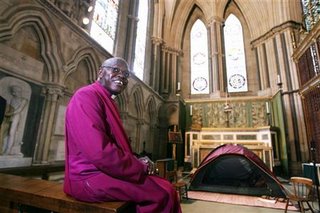
Dr John Sentamu, Archbishop of York, holds a position in the Anglican Communion second only to the Archbishop of Canterbury, as he is considered the Primate of the Anglican Church in England.
Archbishop Sentamu, (Official biography from the Anglican Communion News Service) was born in 1949 in Uganda and had a career of law there, until he had to leave to escape persecution by then-dictator Idi Amin. Sentamu had reached the post of a judge on Uganda's High Court, and was considered "an opponent and agitator". He was allowed to leave Uganda in 1974, to study theology at Cambridge University, on the condition that he never return to Uganda.
Sentamu was ordained in 1979, and held several positions as Chaplin, Curate, priest and Vicar until his election as Bishop of Stepney (1996) and Bishop for Birmingham (2002). He was installed as Archbishop for York in 2005, the first person of color to so serve.
This past weekend Archbishop Sentamu started a vigil in solidarity with the ordinary people on both sides of the current violence between Israel and Hezbollah elements in Lebanon. A Reuters article from Friday ("Archbishop to hold vigil for Mideast") notes that Sentamu will forgo a planned vacation and will spend the week sleeping in the cathedral and fasting. He will also lead prayers each hour for seven days for those affected by the fighting between the opposing military forces.
From Reuters:
"In the Middle East there are thousands of people sleeping in churches, bunkers, underground car parks and shelters in an attempt to escape from the bombs and rockets that are falling on both sides of the border,"::snip::
"This act is a rallying call to people of all faiths and none, to encourage them to feel that there is something that can be done."Sentamu also chastised U.S. President G.W. Bush, noting that Bush calling the U.S. involvement in the Middle East meant the U.S. was "at war with Islamic fascists" was counter-productive.
That was not the first foray of Sentamu's to chastise U.S. policy -- in February of this year, Sentamu called the U.S. to task for its treatment of prisoners at Guantanamo Bay, when he likened what this administration is doing to what he saw Idi Amin do in his native Uganda:
"..By "declaring war on terror" President Bush is perversely applying the rules of engagement which apply in a war situation. But the prisoners are not being regularly visited by the Red Cross or Red Crescent, which is required by the Geneva Convention. They were not even allowed to be interviewed by the United Nations Human Rights Group.
In Uganda President Amin did something similar: he did not imprison suspects because he knew that in prison the law would apply to them, so he created special places to keep them. If the Guantanamo Bay detainees were on American soil, the law would apply. This is a breach of international law and a blight on the conscience of America."
The Archbishop had previously said (17/02/06)
"The American Government is breaking international law. Whatever they may say about democracy, to hold someone for up to four years without charge clearly indicates a society that is heading towards George Orwell's Animal Farm.
The main building block of a democratic society is that everyone is equal before the law, is innocent until proved otherwise and has the right to legal representation. If the guilt of the prisoners in Guantanamo Bay is beyond doubt, why are the Americans afraid to bring them to trial? Transparency and accountability are the other side of the coin of freedom and responsibility.
We are all accountable for our actions in spite of circumstances. The events of 9/11 cannot erase the rule of law and international obligations. I back the United Nations Human Rights Commission report, recommending that the US try all the detainees, or free them without further delay. If the US refuses to respond, maybe the Commission should seek a writ of Habeas Corpus in a United States Court, or at the Hague."
Thanks to Susie at Suburban Guerrilla where I first saw the Reuter's article.
No comments:
Post a Comment